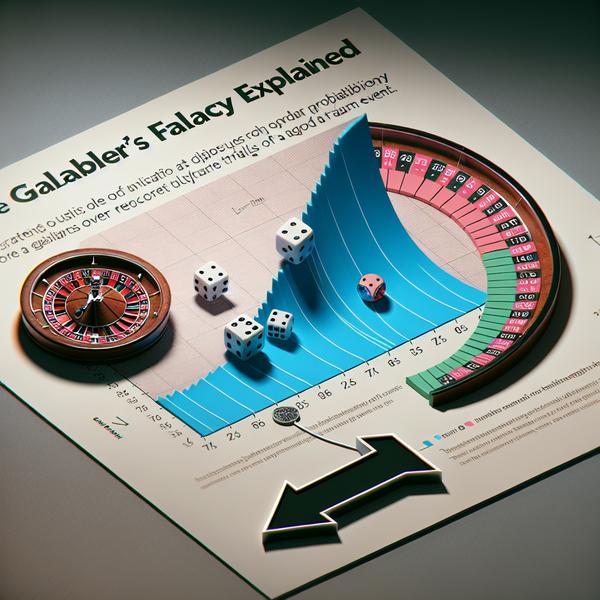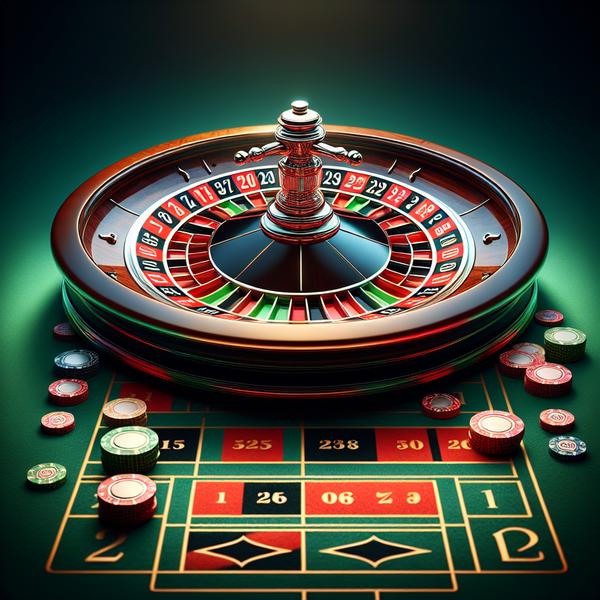The Gambler's Fallacy and How It Affects Betting Decisions
Introduction to Gambler's Fallacy
The Gambler's Fallacy is a common mistake in betting and online gambling, where people think that past events influence future ones. This is not true because each event happens on its own. Believing this fallacy causes bad decisions.
There are three key ideas behind the Gambler's Fallacy:
- The belief in a "hot" streak.
- The assumption that a "win" must follow a "loss".
- The expectation of a balance over short terms.
If you win a few times, thinking you will keep winning is wrong. The results are random and not affected by past wins. Believing this can make you take unsafe bets.
Believing that a win must come after a loss is wrong. Each coin flip is always a 50/50 chance, no matter how past flips turned out. This is also true for slot machines and other games of luck. Trusting these wrong ideas can lead to unexpected losses.
Understanding Randomness in Gambling

It's important to know that gambling results are unpredictable. Some people believe they can guess what will happen next, but this is usually because they don't understand how randomness works. Here are some important things to know about randomness in gambling:
- Randomness means outcomes are unpredictable.
- Previous results do not influence future outcomes.
- Random events have no memory.
- Perceiving patterns in random events is common but misleading.
In gambling, randomness means that each event, like a roulette wheel spin or a poker hand, is independent from others. For example, in a coin toss, each flip stands alone, and past outcomes don't influence future ones. This is important to know when considering betting systems like Martingale.
Many gamblers make the mistake of thinking that if something happens a lot in a short time, it will happen less later. But in reality, each event in casino games is separate. Losing many bets in a row does not make winning the next one more likely. Knowing this can help avoid bad betting choices.
Online gambling depends on randomness. Random Number Generators (RNGs) make sure games are fair. RNGs produce random results for games like slots and online poker. Trusting these random results is important. If you doubt them, you might use bad strategies and be disappointed. Knowing how RNGs work can help you gamble online better.
Recognizing Fallacy in Betting

When betting, it's important to understand the Gambler's Fallacy. This is the wrong idea that past events influence future ones. For example, if a coin shows heads five times, you might wrongly think that tails will come next. This type of thinking can cause bad betting choices.
When betting, watch for signs of the Gambler's Fallacy. These signs include believing that past outcomes affect future ones in situations that are actually random.
- Believing that certain numbers are "due" to win.
- Thinking that a losing streak means a win is coming.
- Placing bets based on previous outcomes rather than odds.
It's important to recognize these signs. Thinking that past wins or losses affect future ones can affect your decisions. Each game is independent of the previous ones. Casinos and online gambling sites profit when players make this mistake.
To avoid mistakes, you need knowledge and self-control. Depend on statistics, not past events. Forgetting previous results can help you make better bets. This will improve your strategy and decrease your chances of losing money.
Common Misconceptions Explained

Some people think that if a coin lands on heads many times, it must land on tails soon. This is not true. The Gambler's Fallacy is a mistake about how probability works. Each coin flip is independent, and past flips do not affect future ones.
Here are some common misconceptions associated with the Gambler's Fallacy:
- Believing that past events influence future outcomes
- Thinking that a "run" of a certain event means it will change soon
- Assuming that probability evens out in the short term
Many people wrongly believe that if something happens often in the short term, it will quickly balance out. This is not true. Short-term results can vary widely. Probability only evens out over a long period.
Online gamblers often believe they can spot patterns in random events. When they see a roulette wheel land on red several times, they bet on black, thinking it is more likely to come next. This belief is wrong. It is important to understand that each event is random and independent of previous outcomes.
Our latest online casino reviews (2024)
Psychology Behind Gambler's Fallacy

The Gambler’s Fallacy is a common mistake in thinking. It makes people believe that past events affect future outcomes. This often happens in betting and online gambling. For instance, if a coin lands on heads five times, someone might think tails will come next. However, each coin flip is separate and not influenced by the previous ones.
Three key factors contribute to the Gambler's Fallacy:
- **Misunderstanding Probability**: People often think small sequences reflect overall probabilities.
- **Desire for Patterns**: Humans look for patterns where none exist.
- **Emotional Investment**: Personal losses lead to irrational beliefs in winning streaks.
Emotional investment in gambling is a big problem. Gamblers often feel they need to win back their losses and think they are due for a win. This belief causes them to make risky bets and lose even more money. Understanding this can help prevent bad choices. Staying calm and clear-headed is important when gambling online.
Many people are misled by their need to see patterns. Humans naturally look for patterns, which is helpful in everyday activities but not in betting. Each gambling event happens randomly. Acknowledging this randomness can lead to better decisions. Remember, past results do not predict future results.
Impact on Betting Decisions

The Gambler's Fallacy often impacts how people bet. Many gamblers wrongly think that previous results affect future outcomes. This mistaken belief can cause poor decisions and money loss.
Here are some ways the Gambler's Fallacy can impact your betting choices:
- Trusting patterns that don't exist.
- Overestimating the power of streaks.
- Mismanaging your betting funds.
People often believe they see patterns in random events. For instance, if a roulette wheel lands on black several times, some people think red will come up next. This belief is incorrect and can lead to bad betting choices. The results of previous spins do not influence future spins.
Gamblers often think a series of wins or losses will continue. If you're losing, it doesn't mean you'll win soon. If you're winning, it doesn't mean you'll keep winning. This mistaken belief can lead to bigger, riskier bets.
Not knowing how probabilities work can make you manage your money badly. Gamblers might spend more to try to recover losses or bet larger amounts when they think they're lucky. Both actions are risky and usually lead to bigger losses. Knowing about the Gambler's Fallacy can help avoid these expensive errors while gambling online.
Case Studies and Examples

In 2010, a man in Las Vegas thought he could figure out when a slot machine would give out money. This idea caused him to lose $15,000 in one night. This is an example of the Gambler's Fallacy. He believed that because the machine hadn't given out money in a while, it was likely to do so soon. But each spin of the slot machine is random and not affected by previous spins. This wrong belief can cause people to lose a lot of money.
A study conducted by the University of Cambridge reviewed online gambling behavior. They found that many players fall victim to the Gambler's Fallacy. Here are some key findings:
- 70% of participants believed previous outcomes influenced future results
- 50% increased their bets after consecutive losses
- 30% of frequent gamblers were most susceptible
In 2015, a well-known online poker player kept losing for a week and doubled his bets each day, thinking he was bound to win soon. Instead, he ended up with over $50,000 in debt. This shows how dangerous it can be to think a win is guaranteed in online gambling. Believing a win was going to happen led to risky betting.
In 2017, the University of Sydney studied sports betting by surveying 500 bettors. They found that many people bet more after losing, thinking they were due for a win. This wrong belief led to bad betting choices. The study said that knowing about the Gambler's Fallacy could help reduce these mistakes.
Preventing Gambler's Fallacy

To avoid the Gambler's Fallacy, remember that each game event is separate and independent. The result of one bet does not influence the outcome of the next. This is a basic rule that many gamblers forget.
Here are some practical steps to help you prevent the Gambler's Fallacy:
- Educate yourself about the independence of events.
- Keep track of your bets and their outcomes.
- Set strict betting limits.
- Avoid emotional decision-making.
It's important to keep track of your bets. Recording them helps you see results over time. This can reveal behaviors that show you believe in wrong ideas about gambling. It also helps you stay calm and make better decisions.
Always set strict betting limits. This helps you control how much money you are willing to lose. Following these limits can stop you from betting more because you wrongly think you will win soon. Emotional decisions can lead to bigger losses and are often influenced by incorrect beliefs.
Conclusion and Key Takeaways

The Gambler's Fallacy is important to understand for anyone making bets or gambling online. This mistake can cause bad choices. It happens when people think that past random events will change future ones. This thinking is wrong and confusing.
To avoid Gambler's Fallacy mistakes, focus on these main points: Each event in a series of independent events is not influenced by prior events. Previous outcomes do not change the probability of future outcomes.
- Recognize randomness: Each event, whether a coin toss or roulette spin, is independent of previous events.
- Avoid pattern assumptions: Just because something hasn't happened recently, doesn't mean it’s due to happen.
- Stay rational: Base betting decisions on facts and probabilities, not on the false belief that streaks or patterns matter.
- Seek information: Educate yourself on statistical realities and probabilities in gambling scenarios.
Many gamblers wrongly believe in the Gambler's Fallacy. They might think that if a coin shows heads several times, it is more likely to show tails next, but the chances stay the same. This incorrect idea affects many types of gambling.
It's important to think clearly when gambling. The results are unpredictable and not connected to each other. Making smart choices means knowing that past results won't affect future ones. This understanding can stop many expensive mistakes.
Understanding the Gambler's Fallacy can help you with your betting. It lets you make better decisions, avoid mistakes, and possibly save money. Remember the key points and use them in your betting and online gambling.
Our latest online gambling guides (2024)
Latest reviews of online casinos (2024)
Share this article











The Gambler's Fallacy is the belief that past outcomes affect future ones. This is a big mistake in online gambling. For example, just because the roulette wheel has landed on black several times, it doesn't mean that red will come next. Believing this often leads to bad bets and unnecessary losses.